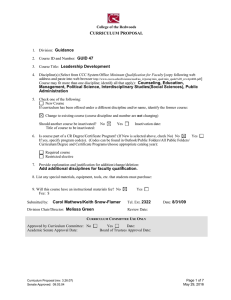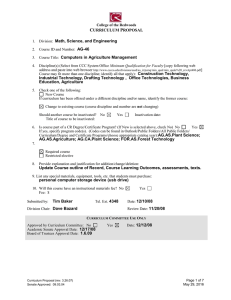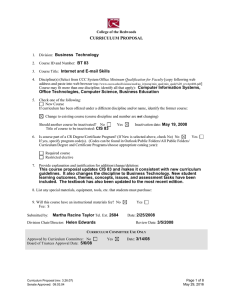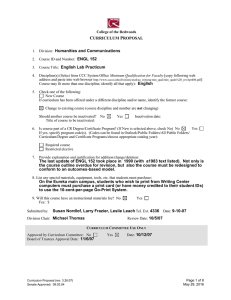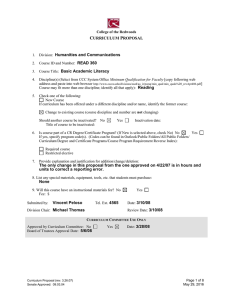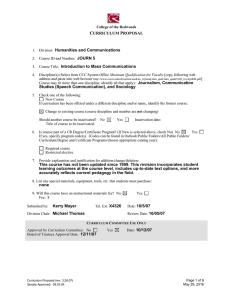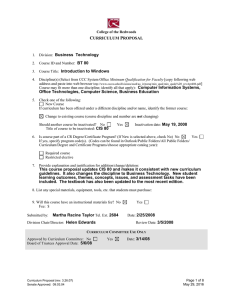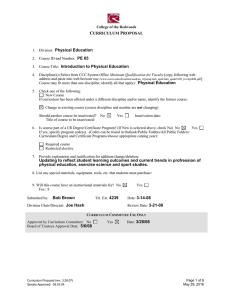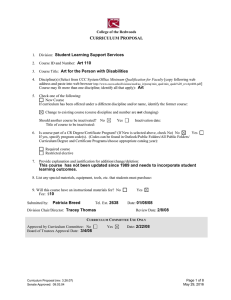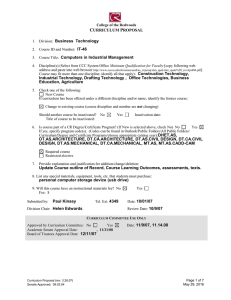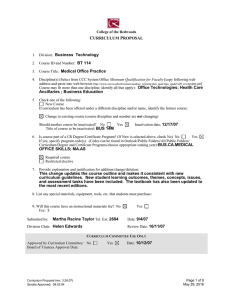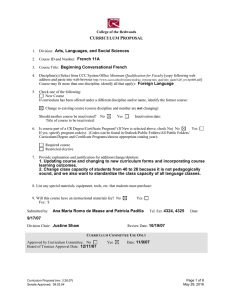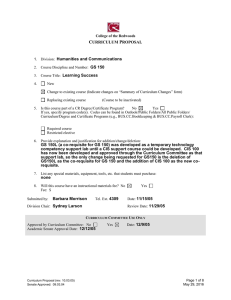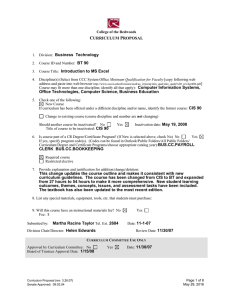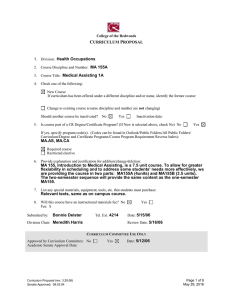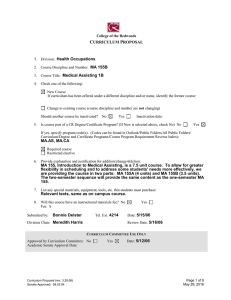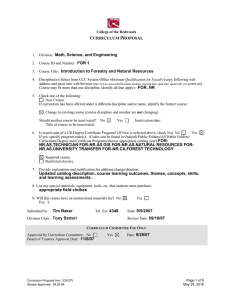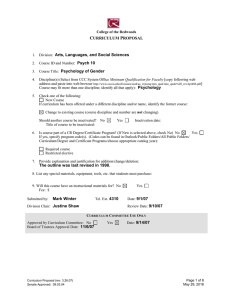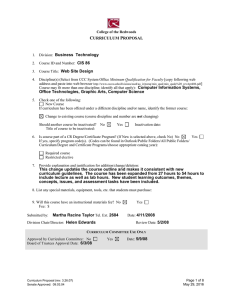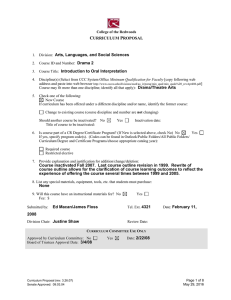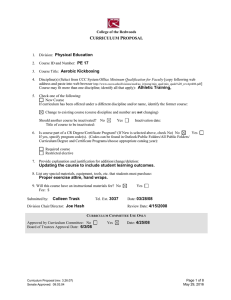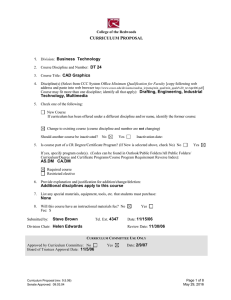C P URRICULUM
advertisement
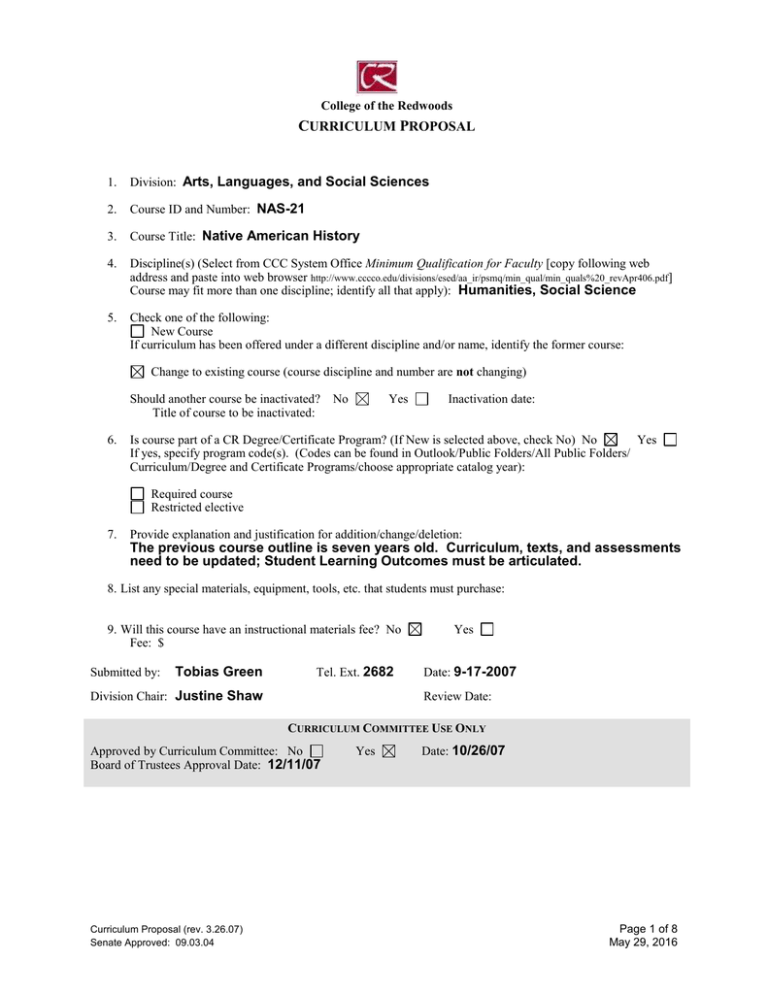
College of the Redwoods CURRICULUM PROPOSAL 1. Division: Arts, Languages, and Social Sciences 2. Course ID and Number: NAS-21 3. Course Title: Native American History 4. Discipline(s) (Select from CCC System Office Minimum Qualification for Faculty [copy following web address and paste into web browser http://www.cccco.edu/divisions/esed/aa_ir/psmq/min_qual/min_quals%20_revApr406.pdf] Course may fit more than one discipline; identify all that apply): Humanities, Social Science 5. Check one of the following: New Course If curriculum has been offered under a different discipline and/or name, identify the former course: Change to existing course (course discipline and number are not changing) Should another course be inactivated? Title of course to be inactivated: 6. No Yes Inactivation date: Is course part of a CR Degree/Certificate Program? (If New is selected above, check No) No Yes If yes, specify program code(s). (Codes can be found in Outlook/Public Folders/All Public Folders/ Curriculum/Degree and Certificate Programs/choose appropriate catalog year): Required course Restricted elective 7. Provide explanation and justification for addition/change/deletion: The previous course outline is seven years old. Curriculum, texts, and assessments need to be updated; Student Learning Outcomes must be articulated. 8. List any special materials, equipment, tools, etc. that students must purchase: 9. Will this course have an instructional materials fee? No Fee: $ Submitted by: Tobias Green Tel. Ext. 2682 Division Chair: Justine Shaw Yes Date: 9-17-2007 Review Date: CURRICULUM COMMITTEE USE ONLY Approved by Curriculum Committee: No Board of Trustees Approval Date: 12/11/07 Curriculum Proposal (rev. 3.26.07) Senate Approved: 09.03.04 Yes Date: 10/26/07 Page 1 of 8 May 29, 2016 SUMMARY OF CURRICULUM CHANGES FOR AN EXISTING COURSE FEATURES Catalog Description (Please include complete text of old and new catalog descriptions.) Grading Standard OLD NEW A survey of Native American History from pre-Columbian times through the present. The histories of specific tribes will be examined in order to illustrate broad historical dynamics and how those dynamics inform contemporary position and treatment of Native Americans. This course will examine the impacts of politics, the law, and culture on the American Indian in U.S. history. A survey from pre-Columbian origins to the present. This course examines the trajectories of indigenous societies, their interactions with European invaders, and their vital role in the development of a multiethnic nation-state in North America. It examines the historical context of contemporary Native American political, cultural, legal, and economic conditions, and the role of Native Americans in contemporary society. Select Select None English 1A eligible Total Units Lecture Units Lab Units Prerequisites Corequisites Recommended Preparation Maximum Class Size Repeatability— Maximum Enrollments Other If any of the listed features have been modified in the new proposal, indicate the “old” (current) information and proposed changes. Curriculum Proposal (rev. 3.26.07) Senate Approved: 09.03.04 Page 2 of 8 May 29, 2016 College of the Redwoods COURSE OUTLINE DATE: 09-14-2007 COURSE ID AND NUMBER: NAS-21 COURSE TITLE: Native American History FIRST TERM NEW OR REVISED COURSE MAY BE OFFERED: Spring 2008 TOTAL UNITS: 3 TOTAL HOURS: 54 [Lecture Units: 3 [Lecture Hours: 54 Lab Units: Lab Hours: ] ] MAXIMUM CLASS SIZE: 40 GRADING STANDARD Letter Grade Only CR/NC Only Is this course repeatable for additional credit units: No Grade-CR/NC Option Yes If yes, how many total enrollments? Is this course to be offered as part of the Honors Program? No Yes If yes, explain how honors sections of the course are different from standard sections. Honors sections will have additional reading and writing assignments, typically at least one more major monograph or collection of scholarly essays and at least one more term paper. Honors essays should reflect the reading of secondary sources--historical, cultural, and/or critical works--which may not be a requirement in regular sections. Honors students may also take a more active role in conducting the class by leading discussions and/or making presentations. CATALOG DESCRIPTION The catalog description should clearly state the scope of the course, its level, and what kinds of student goals the course is designed to fulfill. A survey from pre-Columbian origins to the present. This course examines the trajectories of indigenous societies, their interactions with European invaders, and their vital role in the development of a multiethnic nation-state in North America. It examines the historical context of contemporary Native American political, cultural, legal, and economic conditions, and the role of Native Americans in contemporary society. Special notes or advisories: PREREQUISITES No Yes Course(s): Rationale for Prerequisite: Describe representative skills without which the student would be highly unlikely to succeed . Curriculum Proposal (rev. 3.26.07) Senate Approved: 09.03.04 Page 3 of 8 May 29, 2016 COREQUISITES No Yes Rationale for Corequisite: Course(s): RECOMMENDED PREPARATION No Yes Course(s): English 1A eligible Rationale for Recommended Preparation: Success in this course requires college-level reading and writing skills to complete readings, papers, and essay exams. COURSE LEARNING OUTCOMES What should the student be able to do as a result of taking this course? State some of the objectives in terms of specific, measurable student accomplishments. 1. Evaluate interactions among Native Americans, immigrant groups from other continents, and the governments of European colonies and of the United States. 2. Compare and contrast the experiences of various Native American groups based on such factors as regional location and ideology. 3. Compare and contrast the periodization and effects of historical developments for Native Americans and other ethnic/cultural groups in the United States. 4. Analyze primary and secondary sources relating to Native American history. 5. Analyze historical issues and the historiographic interpretations of those issues. 6. Synthesize events, recognize cause-effect relationships, and summarize findings. 7. Apply knowledge of historical information to create their own arguments. 8. Explain the major social, political, economic, and cultural developments in Native American societies in historical perspective. 9. Sustain written and oral arguments through the use of evidence and logic. 10. Explain that history is based on argument and interpretations of information. 11. Explain how historians have analyzed and interpreted changing social power relations, including but not limited to race, ethnicity, class, gender, technology, production, and religion. COURSE CONTENT Themes: What themes, if any, are threaded throughout the learning experiences in this course? 1. Race, class, gender, ethnicity, and religion as systems of power relations. 2. The marginalization of indigenous groups in developing nation-states. 3. The cultural persistance and contributions of indigenous societies in that context. 4. The variety of contemporary and historical Native American cultures. 5. The importance of both formal and informal social and governmental institutions in creating and modifying relationships among Native American groups, and among them and other groups in the United States. Concepts: What concepts do students need to understand to demonstrate course outcomes? 1. Indigenous peoples. 2. Colonialism and imperialism. 3. Social control. 4. Ethnohistory and ethnogenesis. 5. Cultural regeneration. 6. Historical interpretation. 7. Social and cultural change over time. 8. Historical analysis centered on a specific, complex cultural group. Curriculum Proposal (rev. 3.26.07) Senate Approved: 09.03.04 Page 4 of 8 May 29, 2016 Issues: What primary issues or problems, if any, must students understand to achieve course outcomes (including such issues as gender, diversity, multi-culturalism, and class)? 1. Multiculturalism in a diverse but unitary nation-state. 2. Cultural relativism as a key to understanding multicultural societies. 3. The evolution of unequal power relationships between Native Americans and intrusive, dominating societies. Skills: What skills must students master to demonstrate course outcomes? 1. Critical reading and thinking. 2. Argumentative and analytical writing. 3. Historical argumentation supported by facts. REPRESENTATIVE LEARNING ACTIVITIES What will students be doing (e.g., listening to lectures, participating in discussions and/or group activities, attending a field trip)? Relate the activities directly to the Course Learning Outcomes. 1. 2. 3. 4. 5. Listening to lectures. Analyzing images and other primary documents. Participating in discussions. Responding, verbally and in writing, to sets of historical facts. Composing in-class and out-of-class essays and papers. ASSESSMENT TASKS How will students show evidence of achieving the Course Learning Outcomes? Indicate which assessments (if any) are required for all sections. Representative assessment tasks: 1. 2. 3. 4. Reading journals. Periodic response papers on major issues. Analytical essays. Examination questions. Required assessments for all sections – to include but not limited to: 1. At least one sustained writing exercise, such as an essay. 2. At least one examination including an essay and/or short answer questions. EXAMPLES OF APPROPRIATE TEXTS OR OTHER READINGS Author, Title, and Date Fields are required Author R. David Edmunds et al Mifflin, 2007 Author Dee West Date Title The People: A History of Native America Date Houghton Brown Title Bury My Heart at Wounded Knee: An Indian History of the American Holt, 2007 Other Appropriate Readings: In addition to a general textbook, readings should include a mongraph or selection of essays which will expand on major themes or provide enirching detail. Suggestions include Thomas D. Hall, Social Change in the Southwest, 1350-1880 (University of Kansas, 1989), Frederick E. Hoxie, ed., Talking Back to Civilization: Indian Voices from the Progressive Era (Bedford, 2001), Calvin Martin, ed. , The American Indian and the Problem of History (Oxford, 1987), Peter Nabokov, ed., Native American Testimony (Penguin, 1999), John G. Neihardt, Black Elk Speaks (University of Nebraska, 1981), Daniel K. Richter, Facing East from Indian Country: A Native History of Early America (Harvard, 2001), Daniel H. Usner Jr., Indians, Settlers & Slaves in a Frontier Economy: The Lower Mississippi Valley before 1783 (University of North Carolina, 1992). Curriculum Proposal (rev. 3.26.07) Senate Approved: 09.03.04 Page 5 of 8 May 29, 2016 PROPOSED TRANSFERABILITY: CSU UC If CSU transferability is proposed (courses numbered 1-99), indicate whether general elective credit or specific course equivalent credit is proposed. If specific course equivalent credit is proposed, give course numbers/ titles of at least two comparable lower division courses from a UC, CSU, or equivalent institution. None General elective credit Specific course equivalent 1. , (Campus) 2. , (Campus) CURRENTLY APPROVED GENERAL EDUCATION CR CSU IGETC CR GE Category: Social Science CSU GE Category: D (History) IGETC Category: Area 4 PROPOSED CR GENERAL EDUCATION Rationale for CR General Education approval (including category designation): Natural Science Social Science Humanities Language and Rationality Writing Oral Communications Analytical Thinking PROPOSED CSU GENERAL EDUCATION BREADTH (CSU GE) A. Communications and Critical Thinking A1 – Oral Communication A2 – Written Communication A3 – Critical Thinking C. Arts, Literature, Philosophy, and Foreign Language C1 – Arts (Art, Dance, Music, Theater) C2 – Humanities (Literature, Philosophy, Foreign Language) E. Lifelong Understanding and SelfDevelopment E1 – Lifelong Understanding E2 – Self-Development B. Science and Math B1 – Physical Science B2 – Life Science B3 – Laboratory Activity B4 – Mathematics/Quantitative Reasoning D. Social, Political, and Economic Institutions D0 – Sociology and Criminology D1 – Anthropology and Archeology D2 – Economics D3 – Ethnic Studies D5 – Geography D6 – History D7 – Interdisciplinary Social or Behavioral Science D8 – Political Science, Government and Legal Institutions D9 – Psychology Rationale for inclusion in this General Education category: Same as above Curriculum Proposal (rev. 3.26.07) Senate Approved: 09.03.04 Page 6 of 8 May 29, 2016 Proposed Intersegmental General Education Transfer Curriculum (IGETC) 1A – English Composition 1B – Critical Thinking-English Composition 1C – Oral Communication (CSU requirement only) 2A – Math 3A – Arts 3B – Humanities 4A – Anthropology and Archaeology 4B – Economics 4E – Geography 4F – History 4G – Interdisciplinary, Social & Behavioral Sciences 4H – Political Science, Government & Legal Institutions 4I – Psychology 4J – Sociology & Criminology 5A – Physical Science 5B – Biological Science 6A – Languages Other Than English Rationale for inclusion in this General Education category: Curriculum Proposal (rev. 3.26.07) Senate Approved: 09.03.04 Same as above Page 7 of 8 May 29, 2016 FOR VPAA USE ONLY PROGRAM AND COURSE NUMBER NAS-21 TECHNICAL INFORMATION 1. Department: SSCI Social Science 16. CoRequisite Course: None 2. Subject: NAS 17. Recommended Prep: Engl-150 Course No: 21 3. Credit Type: D Credit Degree Applicable 18. Maximum Class Size: 40 4. Min/Maximum Units: 3.0 to 19. Repeat/Retake: NR No repeats variable units 5. Course Level: E Not Occupational 20. Count Retakes for Credit: yes no 6. Academic Level: UG Undergraduate 21. Only Pass/No Pass: yes no 7. Grade Scheme: UG Undergraduate 22. Allow Pass/No Pass: yes no 8. Short Title: Native American History 23. VATEA Funded Course: yes no 9. Long Title: Native American History 24. Accounting Method: W Weekly Census 10. National ID 11. Local ID (CIP): (TOPS): 05.0102 220120 12. Course Types: Level One Basic Skills: NBS Not Basic Skills 25. Disability Status: N Not a Special Class 26. Billing Method: T-Term 27. Billing Period: R-Reporting Term 28. Billing Credits: 3.0 Level Two Work Experience: NWE Not Coop Work Experience 29. Purpose: A Liberal Arts Sciences Level Three: 30. Articulation No. Placeholder for GE OR (CAN): Choose One: 31. Articulation Seq. Level Four: If GE : 32. Transfer Status: A Transfers to both UC/CSU (CAN): D Human Social (PolEcon) 33. Equates to another course? (course number). 13. Instructional Method: Choose One: 14. Lec TLUs: 4.5 Contact Hours: 54 Lab TLUs: Contact Hours: Lecture/Lab TLUs: Contact Hours: 34. The addition of this course will inactive number). Inactive at end of term. 15. Prerequisite: None Particular Comments for Printed Catalog. . Curriculum Approval Date: 10/26/07 Curriculum Proposal (rev. 3.26.07) Senate Approved: 09.03.04 Page 8 of 8 May 29, 2016 (course
